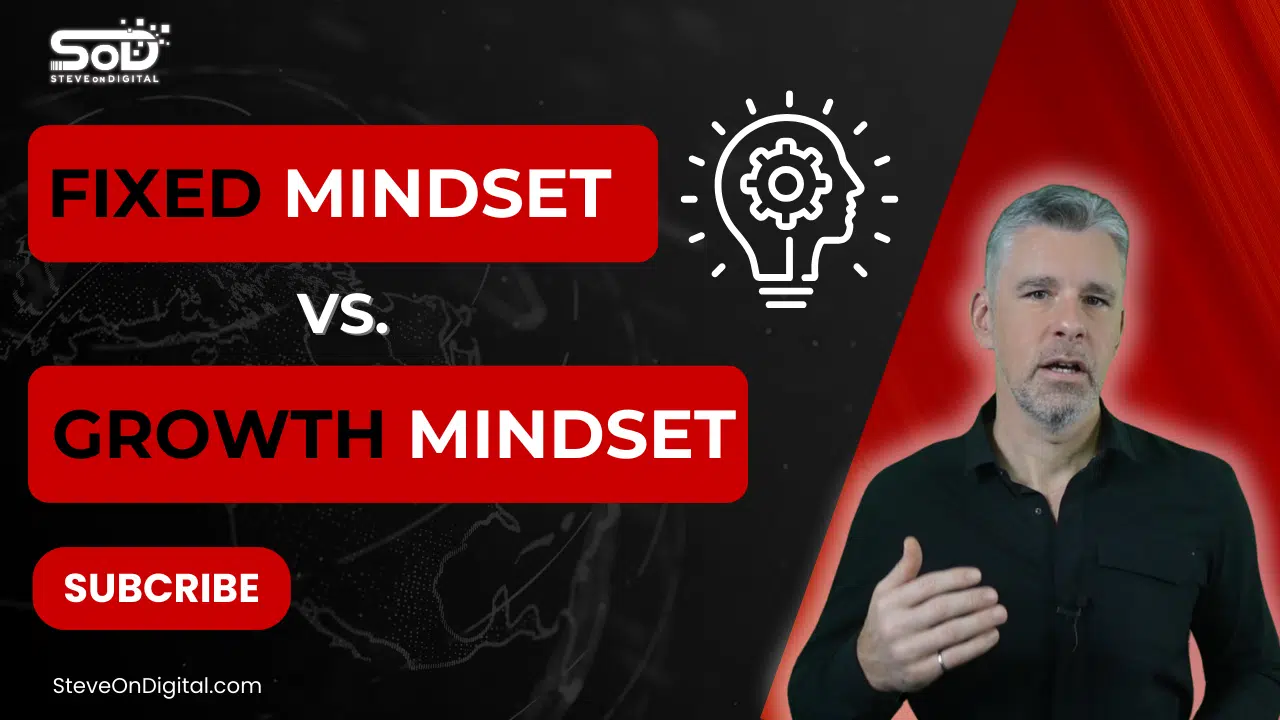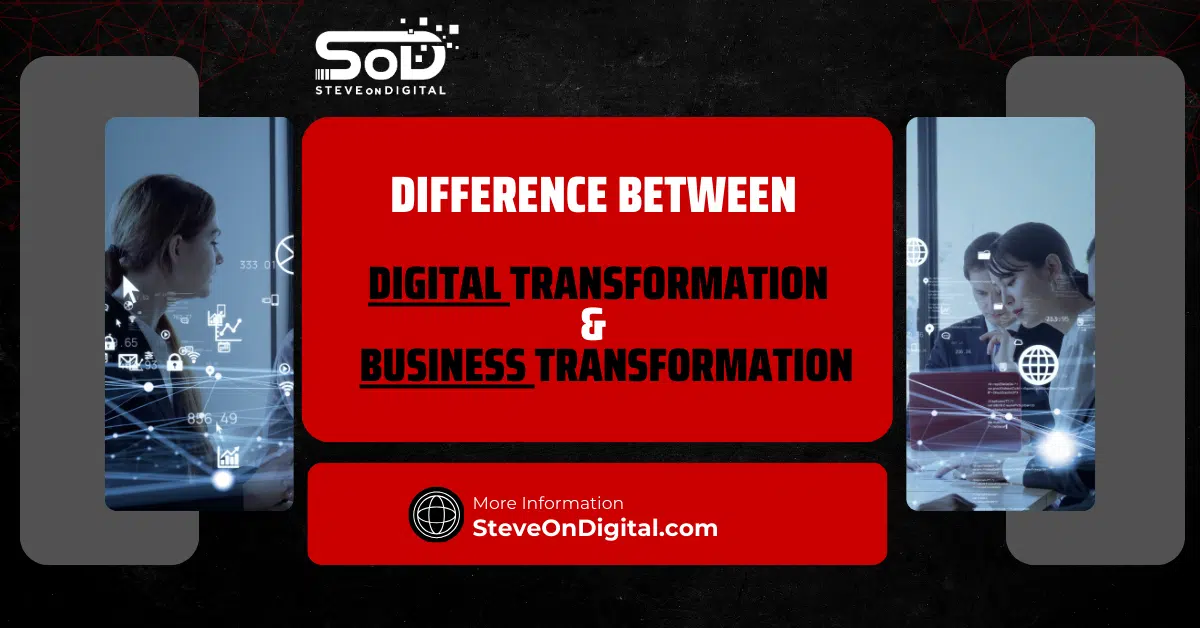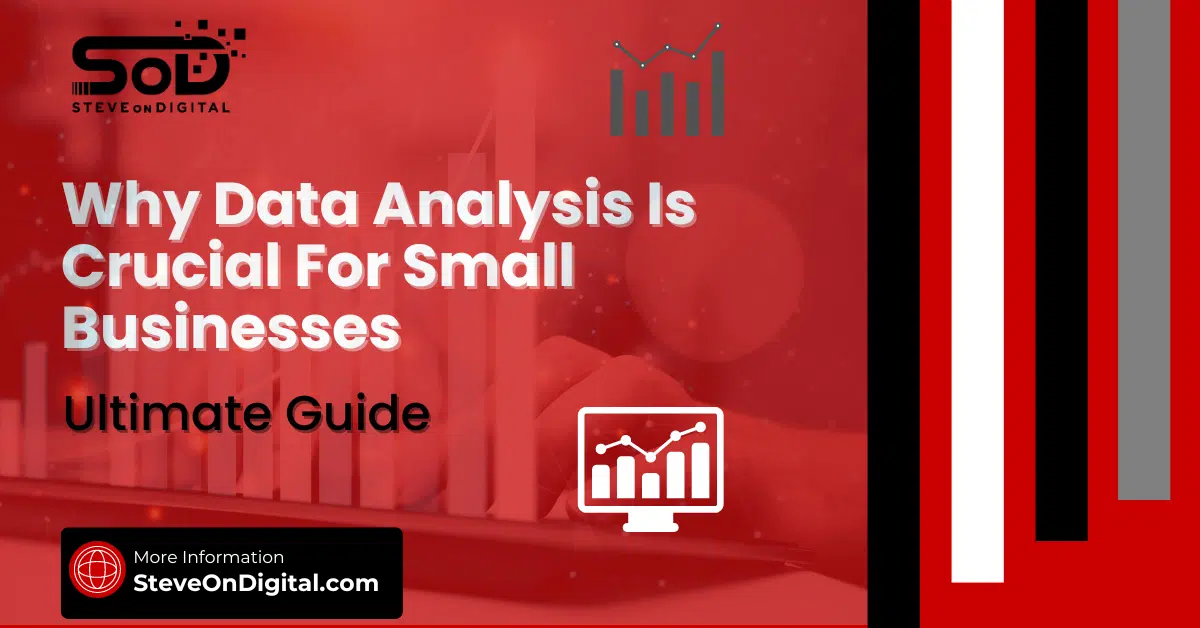A growth mindset in business means believing that abilities and intelligence can improve through effort and learning. This approach fosters innovation, adaptability, and long-term success by encouraging continuous learning and improvement.
Carol Dweck’s decades of research on growth mindset have shown how this approach can significantly influence organizational culture, leading to innovation and collaboration in the workplace.
I’ve seen firsthand how adopting a growth mindset can transform a business. By focusing on challenges as opportunities, fostering team development, and promoting a culture of continuous improvement, businesses can stay competitive in a rapidly changing market. Let’s explore how this powerful mindset can drive success and innovation in your organization.
I’m Steve, a digital transformation expert with a strong background in electrical engineering, an MBA, and a master’s in Project Management. I excel at helping SMEs navigate the digital landscape with practical insights. Let’s begin!
Understanding Growth Mindset in Business
A growth mindset in business is essential for fostering innovation, adaptability, and long-term success. By focusing on continuous learning and improvement, businesses can navigate challenges more effectively and stay competitive in a rapidly changing market.
Definition and Origin of Growth Mindset
The concept of a growth mindset originates from the work of Stanford University psychology professor Carol Dweck. She defined it as the belief that abilities and intelligence can be developed through dedication and hard work. This contrasts with a fixed mindset, where individuals believe their talents are innate and unchangeable.
Growth Mindset vs. Fixed Mindset
A growth mindset believes that intelligence and skills can improve with effort and persistence. In contrast, a fixed mindset believes that abilities and intelligence are static and unchangeable, which may hinder an individual’s potential. This fundamental difference impacts how individuals approach challenges and learning opportunities. Those with a growth mindset are more likely to embrace new challenges and view failures as opportunities to grow, whereas those with a fixed mindset may avoid challenges for fear of failure.
| Aspect | Growth Mindset | Fixed Mindset |
| Belief | Abilities can be developed | Abilities are static and unchangeable |
| View on Challenges | Embraces challenges as opportunities to grow | Avoids challenges due to fear of failure |
| Response to Failure | Sees failure as a learning opportunity | Sees failure as a limit to abilities |
| Effort | Believes effort is essential for mastery | Believes effort is fruitless if one lacks talent |
| Learning | Continuous learning and improvement are valued | Avoids new learning opportunities |
The Role of Growth Mindset in Business Success
Adopting a growth mindset can lead to significant long-term benefits for businesses. A growth mindset views intelligence, abilities, and talents as qualities that can be developed through effort and persistence. Companies that encourage a growth mindset often see increased innovation, better team development, and improved employee performance. By fostering an environment where continuous learning and improvement are valued, businesses can better adapt to changes and overcome obstacles.
Key Characteristics of Growth Mindset
Several traits define a growth mindset, making it a critical aspect of business success.
| Characteristic | Description |
| Embracing Challenges | Views challenges as opportunities for growth and learning |
| Effort and Persistence | Recognizes that hard work and dedication are essential for success |
| Learning from Mistakes | Understands that mistakes are valuable learning opportunities |
| Continuous Improvement | Focuses on ongoing development and betterment |
| Open to Feedback | Welcomes feedback and uses it to improve |
Embracing Challenges
A growth mindset views challenges as opportunities for growth and learning. In business, this means taking on new projects and exploring uncharted territories without fear of failure. By embracing challenges, businesses can innovate and stay ahead of the competition.
Effort and Persistence
Effort and persistence are crucial in overcoming obstacles and achieving success. A growth mindset acknowledges that hard work and dedication are essential components of progress. This approach helps businesses push through tough times and continue to grow.
Learning from Mistakes
Mistakes are valuable learning opportunities. A growth mindset encourages individuals to analyze their failures, understand what went wrong, and apply those lessons to future endeavors. This attitude helps businesses improve and avoid repeating past errors.
Implementing Growth Mindset in Organizations
Fostering a growth mindset within an organization requires practical steps and strategies.
Leadership and Growth Mindset
Leadership plays a pivotal role in promoting and sustaining a growth mindset culture. Leaders must model growth mindset behaviors, such as embracing challenges and learning from failures. By doing so, they set a positive example for the rest of the organization.
Developing a Growth-Oriented Company Culture
Creating a growth-oriented company culture involves promoting continuous improvement and innovation. This can be achieved by encouraging employees to take risks, experiment with new ideas, and share their insights and experiences.
Training and Development Programs
Implementing training programs helps employees develop new skills and perspectives. Training programs can help employees gain new perspectives by engaging in networking, sharing knowledge, and problem-solving with others. Providing opportunities for learning and growth ensures that employees stay engaged and motivated. These programs can include workshops, seminars, and online courses focused on developing a growth mindset.
Benefits of Growth Mindset in Business
Adopting a growth mindset in business brings a multitude of advantages. From fostering innovation to improving employee satisfaction, the benefits are extensive and impactful.
Increased Innovation and Creativity
A growth mindset fosters a culture of innovation and creativity by encouraging employees to think outside the box. This mindset drives individuals to explore new ideas and perspectives, leading to groundbreaking solutions and advancements. For instance, a company that values innovation can adapt quickly to market changes and stay ahead of competitors. According to a study by PwC, 60% of CEOs believe that creativity is the most important leadership quality for success in business.
Enhanced Team Development
Embracing a growth mindset positively impacts team development by promoting collaboration and continuous learning. A collaborative work environment, supported by leadership, encourages trust, innovation, and effective communication among employees. Teams with a growth mindset are more likely to embrace challenges together, leveraging each other’s strengths to achieve common goals. This collective effort leads to improved team dynamics and higher overall performance. From my experience, fostering a growth mindset within teams has led to more cohesive and productive work environments, where everyone feels valued and motivated to contribute their best.
Improved Employee Performance and Satisfaction
A growth mindset can significantly improve employee performance and satisfaction. When employees believe their abilities can be developed through effort and learning, they are more engaged and committed to their work. This leads to higher job satisfaction and lower turnover rates. A Gallup survey found that companies with engaged employees outperform their peers by 147% in earnings per share.
Overcoming Fixed Mindset Barriers
Identifying and addressing fixed mindset tendencies in the workplace is crucial for fostering a growth-oriented environment.
Recognizing Fixed Mindset Beliefs
Recognizing common fixed mindset beliefs is the first step in overcoming them. Fixed mindset views often manifest as resistance to new challenges, fear of failure, and a reluctance to learn from mistakes. These attitudes can hinder personal and professional growth, limiting the potential of both individuals and the organization.
Shifting from Fixed to Growth Mindset
Transitioning from a fixed mindset to a growth mindset requires practical strategies and a commitment to change. Encouraging self-awareness, providing continuous learning opportunities, and promoting a culture of feedback can help individuals shift their mindset. From my personal journey, I found that regularly reflecting on my experiences and seeking feedback has been instrumental in developing a growth mindset.
Encouraging a Growth Mindset in Teams
Promoting a growth mindset among team members involves creating an environment that values effort, persistence, and learning. Leaders play a crucial role in this process by modeling growth mindset behaviors and providing opportunities for team members to develop new skills. Encouraging open communication and celebrating progress, no matter how small, can also motivate teams to embrace a growth mindset.
Case Studies and Examples
Real-world examples and case studies illustrate the practical application and benefits of a growth mindset in business.
| Company | Growth Mindset Practices | Outcomes |
| Encourages “moonshot” projects and continuous innovation | Development of groundbreaking products like self-driving cars |
| Microsoft | Focus on continuous learning and adaptation under CEO Satya Nadella | Increased market share and innovation |
| Airbnb | Iterates on products and learns from failures | Rapid growth and market adaptation |
| IBM | Fosters a culture of continuous learning and innovation | Maintained competitiveness in the tech industry |
| General Electric | Emphasis on growth-oriented culture and innovation | Sustained leadership position in various sectors |
Tech Companies Leading with Growth Mindset
Tech companies like Google and Microsoft have successfully integrated growth mindset principles into their corporate culture. At Google, employees are encouraged to pursue “moonshot” projects, which are ambitious and innovative initiatives. This approach has led to significant breakthroughs, such as the development of the self-driving car and Google Glass.
Startups Embracing Growth Mindset
Startups like Airbnb and Uber have thrived by adopting growth mindset principles. These companies continuously iterate on their products and services, learning from failures and adapting to market changes quickly. For example, Airbnb’s founders faced multiple rejections and setbacks but persisted, believing in their ability to succeed through continuous learning and adaptation.
Large Organizations and Growth Mindset
Large organizations such as IBM and General Electric have integrated growth mindset into their corporate strategies. IBM’s transformation under CEO Ginni Rometty involved fostering a culture of continuous learning and innovation, which has helped the company remain competitive in the ever-evolving tech industry. Similarly, General Electric’s focus on developing a growth-oriented culture has enabled it to innovate and maintain its leadership position in various sectors.
Growth Mindset in Different Business Areas
A growth mindset isn’t limited to personal development. It can transform every aspect of a business, leading to innovation and success across different functions.
Marketing with a Growth Mindset
In marketing, a growth mindset drives innovation and adaptability. By constantly seeking new ideas and learning from feedback, marketers can create more effective strategies by understanding the target audience and adapting to their evolving needs and preferences. I’ve found that experimenting with different campaigns and analyzing results helps refine our approach, leading to better engagement with the target market. For example, using A/B testing and data analytics to understand customer preferences can significantly improve marketing outcomes.
Sales and Customer Relations
Applying growth mindset principles in sales and customer relations enhances interactions and builds stronger relationships. A growth mindset encourages sales teams to view each interaction as a learning opportunity, fostering resilience and continuous improvement. I’ve seen how this approach can boost sales performance and customer satisfaction by adapting to new challenges and refining sales techniques based on customer feedback.
Product Development and Innovation
Fostering a culture of innovation in product development through a growth mindset leads to groundbreaking products and services. Encouraging teams to experiment and learn from failures accelerates innovation. My experience has shown that creating an environment where new ideas are welcomed and tested without fear of failure drives significant progress and improvement in product offerings.
Tools and Resources
To support the development of a growth mindset in business, various tools and resources are available. These can guide you in fostering a growth-oriented culture.
Books and Articles
Books and articles offer valuable insights into understanding and implementing a growth mindset. Some recommended readings include “Mindset: The New Psychology of Success” by Carol Dweck, which provides foundational knowledge on the topic. Additionally, Harvard Business Review articles often discuss the application of growth mindset in the workplace.
Online Courses and Workshops
Online courses and workshops provide interactive learning opportunities for developing a growth mindset. Platforms like Coursera and LinkedIn Learning offer courses on personal development and leadership that emphasize growth mindset principles. Participating in these can help enhance skills and foster a growth-oriented approach.
Coaching and Mentorship Programs
Coaching and mentorship programs support the growth mindset journey by offering personalized guidance and feedback. Engaging with mentors who embody a growth mindset can provide valuable perspectives and encouragement. From my own experience, having a mentor who challenges and supports you can significantly accelerate personal and professional growth.
Measuring the Impact of Growth Mindset
Evaluating the effectiveness of growth mindset initiatives is crucial to ensure they are making a positive impact.
Key Performance Indicators
Tracking Key Performance Indicators (KPIs) helps measure the progress and impact of growth mindset implementation. KPIs such as employee engagement, innovation rate, and customer satisfaction can provide insights into how well growth mindset principles are being adopted and their effects on business performance.
Employee Feedback and Surveys
Using feedback and surveys to gauge the effectiveness of growth mindset programs is essential. Regularly collecting and analyzing employee feedback can identify areas for improvement and highlight successes. This iterative process helps refine strategies and foster a growth-oriented culture.
Case Studies and Success Stories
Documenting success stories illustrates the impact of growth mindset on business outcomes. Case studies from companies that have successfully implemented growth mindset principles can serve as powerful examples and provide actionable insights. Sharing these stories can motivate others to adopt similar approaches and see the potential benefits.
Final Thoughts
Embracing a growth mindset in business is crucial for long-term success and innovation.
Summary of Key Points
To recap, a growth mindset involves viewing challenges as opportunities, valuing effort and persistence, and learning from mistakes. Implementing these principles across various business functions can lead to increased innovation, better team development, and improved employee performance and satisfaction.
Encouragement to Adopt Growth Mindset
I encourage all business owners to embrace and cultivate a growth mindset. By fostering a culture of continuous learning and improvement, you can unlock your team’s full potential and drive your business towards greater success.
Call to Action
Take the first steps towards implementing a growth mindset in your organization. Start by educating yourself and your team about the principles of a growth mindset, and create an environment that supports continuous learning and experimentation. By doing so, you’ll be well on your way to achieving long-term business success.




